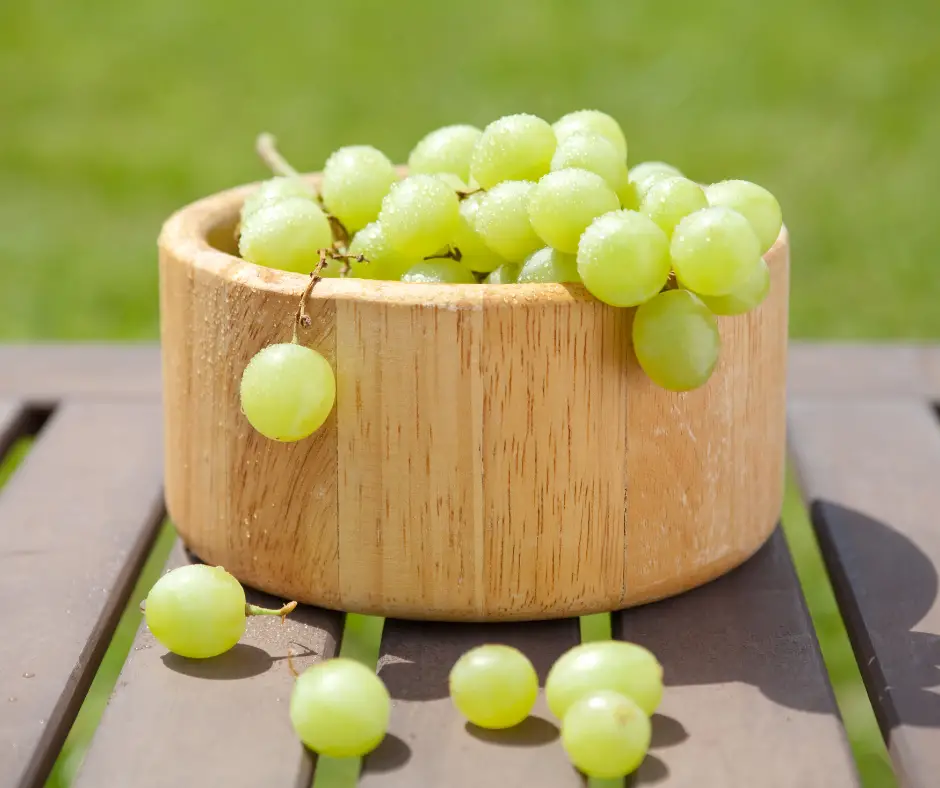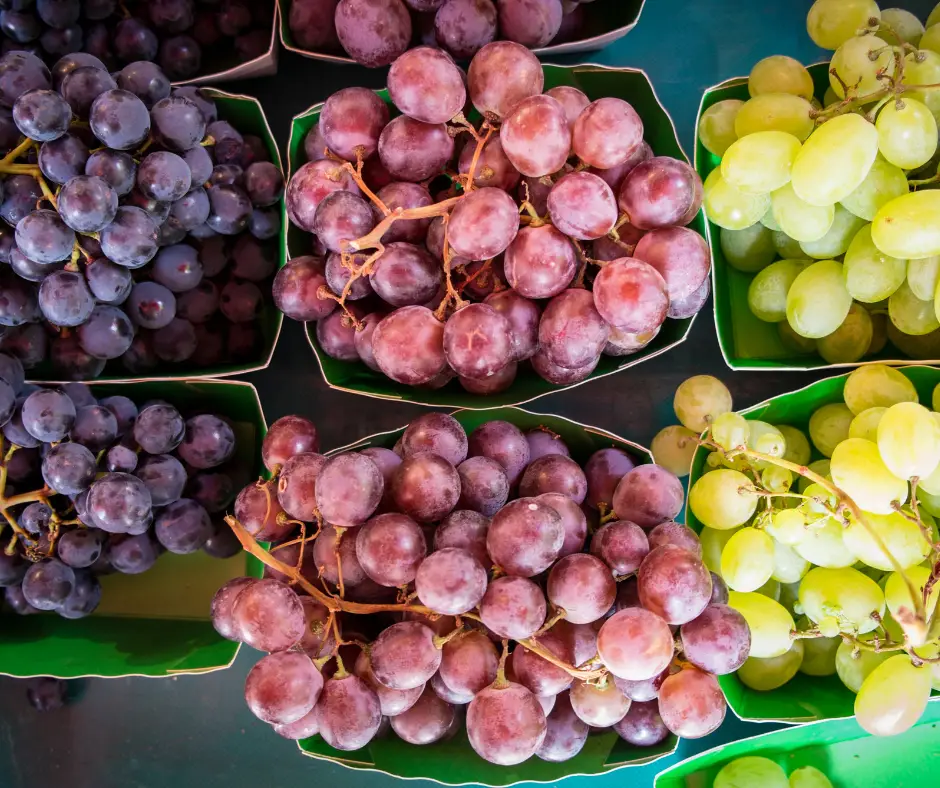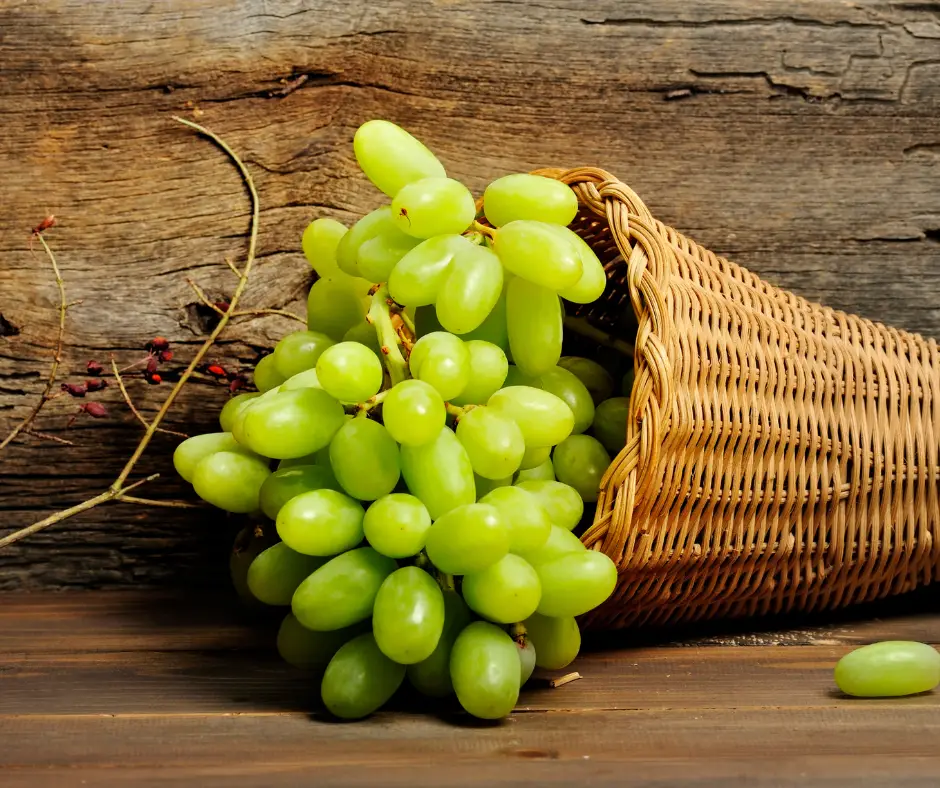Introduction
Grapes are a delicious and nutritious snack that many people enjoy. However, they can quickly spoil if not stored properly. This blog section will explore How To Store Grapes correctly and discuss key factors for keeping them fresh and delicious.

The Importance Of Properly Storing Grapes
Properly storing grapes is essential to maintain their freshness and prolong their shelf life. When stored incorrectly, grapes can become mushy, shriveled, and lose their crispness. Following proper storage techniques ensures that your grapes stay plump, juicy, and tasty for longer.
Key Factors For Keeping Grapes Fresh
There are several key factors to consider when storing grapes to keep them fresh:
- Temperature: Grapes thrive at around 30-32 degrees Fahrenheit with 90-95% humidity. Therefore, the best place to store fresh grapes is in the coldest part of your refrigerator, typically the crisper drawer.
- Avoid Odors: Grapes can absorb odors. To prevent unwanted flavors, it is important to avoid storing them next to smelly foods like onions or fish.
- Moisture: Excess moisture can speed up the decaying process and cause grapes to rot more quickly. Keeping grapes as dry as possible is crucial until you plan to eat them. Only rinse grapes thoroughly under cool running water right before consuming them.
- Airtight Container: Using a special container to store grapes is unnecessary. The ventilated bag or plastic box they come in is ideal. Grapes need a little breathing room to last longer, and sticking them in an airtight container creates humidity that accelerates spoilage.
- Inspect Grapes: It is important to inspect grapes before purchasing them at the grocery store. Avoid grapes that are shriveled, discolored, or show signs of molding. Check for firm attachment at the stem, and do not worry if you see a thin white film on the grapes, called bloom, as it is a natural protective layer.
By following these key factors, you can ensure that your grapes stay fresh, tasty, and ready to enjoy for longer.
In conclusion, properly storing grapes is crucial to maintain their freshness and quality. By considering factors such as temperature, avoiding odors, keeping them dry, using a well-ventilated container, and inspecting grapes before purchase, you can prolong the shelf life of your grapes and enjoy them at their best. So, the next time you bring home a bunch of grapes, store them correctly for a longer-lasting and delicious snacking experience.
Stay tuned for more tips and techniques for properly handling and storing various food items!
How To Store Grapes In The Refrigerator?
Proper storage is key when it comes to keeping grapes fresh and delicious. Whether buying grapes from the grocery store or harvesting them from your garden, knowing how to store them can help extend their lifespan and maintain their crispness. Here are some tips on how to store grapes to keep them fresh and enjoyable for longer periods.
Optimal Temperature And Humidity For Grape Storage
Grapes thrive in a cool and humid environment, which makes the refrigerator the best place to store them. The optimal temperature for storing grapes is 30 to 32 degrees Fahrenheit, with a humidity level of around 90 to 95 percent. This temperature and humidity range helps to prevent water loss and maintain the crispness of the grapes. To achieve this, place the grapes in the back of the refrigerator’s crisper drawer, usually the coldest spot in the fridge. It is important to note that grapes should be refrigerated immediately after bringing them home from the store or garden to prevent spoilage.
Recommended Storage Container For Grapes
Keeping grapes in their original, well-ventilated bag or container is best. Grapes need breathing room to maintain their freshness, so avoid squeezing them into airtight containers like zip-top bags. Sticking grapes in an airtight container creates humidity, leading to moisture buildup and accelerating spoilage. If you no longer have the original packaging, any well-ventilated container will do the job.
To avoid the grapes from absorbing odors from other foods in the refrigerator, it’s important to store them away from strong-smelling items like onions or fish. Additionally, it is recommended to rinse the grapes with cool water right before consuming or using them in recipes. Excess moisture can speed up spoilage, so it’s best to rinse them right before you plan to enjoy them.
Here’s a table summarizing the key information on how to store grapes effectively:
| Aspect | Optimal Condition |
|---|---|
| Temperature | 30-32 degrees Fahrenheit |
| Humidity | 90-95% |
| Storage | Original well-ventilated bag/container |
| Odor Avoidance | Keep away from strong-smelling foods |
| Rinse | Rinse with cool water before consuming |
By following these simple storage tips, you can maximize the lifespan of your grapes and ensure that they stay crisp and delicious for a longer time. Whether you plan to snack on them, use them in recipes, or freeze them for a refreshing treat, properly stored grapes will retain their quality and flavor.
Tips For Washing Grapes

When it comes to enjoying fresh and delicious grapes, proper washing and storage techniques are essential. By following the right methods, you can prolong the freshness of your grapes and ensure they are free from harmful pesticides or bacteria. Here are some tips for washing and storing your grapes to keep them fresh and tasty:
The Best Method For Cleaning Grapes
- Start by cutting the bunches of grapes into smaller clusters while leaving them on the stem. This helps to prevent the grapes from spoiling quickly.
- Fill a large bowl with cool water and add ¼ cup of 5% Distilled White Vinegar.
- Place the grape clusters in the bowl and let them soak for two minutes.
- After the soaking time is up, drain the grape clusters using a colander and give them a good rinse to remove any remaining debris or stems.
- Lay the grapes in a single layer on a clean towel, allowing them to air dry completely. This may take a few hours.
- Once the grapes are completely dry, store them in an airtight glass container.
- You can place a paper towel at the bottom of the container to absorb excess moisture.
- Keep the container in the refrigerator, as the cool temperature will help preserve the freshness of the grapes.
Using Vinegar For Grape Washing
You can create a vinegar bath to clean your grapes if you prefer vinegar. Here’s how to do it:
- Fill a large bowl with 10 cups of cool water.
- Add ¼ cup of Distilled White Vinegar to the water.
- Place the grape clusters in the vinegar bath and let them soak for two minutes.
- After soaking, rinse the grapes in a colander to remove any remaining vinegar.
- Lay the grapes on a clean towel and let them air dry completely.
- Store the grapes in an airtight glass container in the refrigerator with a paper towel at the bottom to absorb excess moisture.
Using vinegar helps to remove any pesticides or bacteria on the grapes, ensuring they are safe to eat. However, it’s important not to soak the grapes for longer than the recommended two minutes, as excess moisture can lead to faster spoiling.
Following these washing and storage techniques, you can keep your grapes fresh for up to six weeks. It’s a simple and effective way to enjoy crunchy and delicious grapes for longer, saving money and reducing food waste. So the next time you bring home a bunch of grapes, take a few minutes to wash them properly and enjoy their freshness for weeks to come.
Drying Grapes For Extended Shelf Life
Knowing How To Store Grapes is crucial to ensure they stay fresh, firm, and delicious for as long as possible. With some simple techniques, you can extend the shelf life of your grapes and enjoy them for weeks. One important step in grape storage is thoroughly drying them before storing them. This helps remove excess moisture and prevents the fruit from rotting quickly.
Importance Of Completely Drying Grapes
Drying grapes before storage is essential because excess moisture can accelerate decay. If grapes are stored while damp, they are more likely to develop mold and spoil faster. Ensuring grapes are bone dry can significantly prolong their freshness and quality.
Methods For Air Drying Grapes
To air-dry grapes, follow these simple steps:
- Lay the grapes in a single layer on a large clean towel.
- Allow them to air dry at room temperature for a few hours until completely dry.
This method will make the grapes bone dry and ready for storage. Handling the grapes gently during this process is important to avoid damaging the delicate fruit.
Once the grapes are completely dry, you can store them using the techniques mentioned in this blog section.
Drying grapes before storage removes excess moisture, preventing the fruit from spoiling quickly. It is a crucial step in maintaining the freshness and quality of grapes for an extended period.
Note: Remember to thoroughly wash grapes before drying them and follow the instructions in the previous blog section for proper cleaning techniques.
Now that you understand the importance of drying grapes and how to do it effectively, you can confidently store them and enjoy their crispness and flavor for weeks.
How To Store Grapes In Glass Containers?
Knowing How To Store Grapes is key to keeping grapes fresh and delicious. You can use several methods to ensure your grapes maintain their flavor and texture for as long as possible. One popular option is storing grapes in glass containers. These airtight containers provide an ideal environment for preserving the freshness of your grapes.
Benefits Of Using Airtight Glass Containers
Using airtight glass containers for grape storage offers several benefits. These containers provide a sealed and moisture-free environment, which helps prevent mold and bacteria growth. The airtight seal also keeps the grapes from absorbing any unwanted odors from the refrigerator, ensuring they maintain their natural taste and aroma. Furthermore, glass containers are free of potentially harmful chemicals, making them a safe and eco-friendly choice for storing food.
To store your grapes in glass containers, follow these simple steps:
- Choose plump and firm grapes without any bruises or mold.
- Wash the grapes gently and let them dry completely.
- Place the grapes in an airtight glass container, making sure not to overcrowd them.
- Seal the container tightly to prevent air and moisture from entering.
- Store the container in the refrigerator at a temperature of 30°F to 32°F for optimal freshness.
Using Paper Towels To Absorb Moisture
Another helpful tip for storing grapes is to use paper towels to absorb excess moisture. This can help prevent the grapes from becoming too moist, leading to spoilage. To use this method, follow these steps:
- Line the bottom of the glass container with a layer of paper towels.
- Place the washed and dried grapes on top of the paper towels in a single layer.
- Use additional paper towels to cover the grapes, creating a second layer.
- Seal the container tightly to maintain its freshness.
The paper towels will absorb any moisture that accumulates, helping to keep the grapes dry and fresh. It’s important to replace paper towels regularly to ensure their effectiveness.
Using airtight glass containers and paper towels to store your grapes can significantly extend their shelf life and keep them tasting delicious. These simple yet effective techniques are worth considering to make the most of your grape harvest or prolong the freshness of store-bought grapes.
So, why not try these methods and enjoy fresh and tasty grapes longer?
Separate Storage For Loose Grapes
Regarding How To Store Grapes, handling loose grapes differently from those still attached to the stem is important. Proper storage techniques can help keep your grapes fresh and delicious for longer periods.
Why Separate Storage For Loose Grapes Is Important
Loose grapes have a shorter shelf life than grapes still on the stem. This is because when grapes are separated from the stem, they are more exposed to air and are more prone to spoilage. By storing loose grapes separately, you can prevent them from causing other grapes to deteriorate faster.
Best Practices For Storing Loose Grapes
To store loose grapes and maximize their freshness, consider the following tips:
- Rinse and dry: Thoroughly rinse loose grapes under cool running water before storing loose grapes. Pat them dry gently to remove any excess moisture.
- Use a well-ventilated container: Instead of an airtight container, opt for a container with ventilation, such as a colander or a reusable plastic container with vents. This allows for proper air circulation and helps the grapes maintain their freshness.
- Store in the refrigerator: Place the well-ventilated container with the loose grapes in the back of the crisper drawer in your refrigerator. The ideal temperature for grapes is between 30 to 32 degrees Fahrenheit with 90 to 95 percent relative humidity. This will help prolong their shelf life and keep them crisp.
- Keep away from strong odors: Grapes can absorb odors, so storing them away from stronger-smelling foods like onions or fish is best. This will help preserve their natural flavor and aroma.
- Check for spoilage: Regularly inspect your stored grapes for any signs of mold, mushiness, or discoloration. If you notice any grapes starting to deteriorate, discard them to prevent spoilage from spreading to the rest of the batch.
By following these best practices for storing loose grapes, you can extend their shelf life and ensure they stay fresh and delicious for as long as possible.
Remember, proper storage is key to maintaining the quality of your grapes. Whether you enjoy them as a refreshing snack or incorporate them into your favorite recipes, storing grapes correctly will help you make the most of this delicious fruit.
How Can Long Store Grapes Last?

When storing grapes, knowing how long they can last is essential to ensure you can enjoy them at their best. Proper storage techniques can significantly extend their shelf life and keep them fresh and delicious for longer periods. Here’s what you need to know about the longevity of stored grapes.
Expected Shelf Life Of Properly Stored Grapes
When stored correctly in the refrigerator, grapes typically last up to three weeks. This is particularly true if you follow the recommended storage guidelines. It’s important to note that the freshness and overall quality of the grapes can vary depending on several factors.
Factors That Affect The Longevity Of Grapes
Several factors can influence how long grapes can last in storage. Here are some key factors to consider:
- Ripeness: The ripeness of the grapes at the time of purchase plays a vital role in determining their shelf life. Slightly under-ripe grapes tend to last longer compared to fully ripe ones.
- Quality: The quality of the grapes is another crucial factor. Opt for plump, firm grapes with vibrant colors and avoid any shriveled, discolored, or show signs of molding.
- Storage Conditions: Proper storage conditions are essential for prolonging the shelf life of grapes. Keep the refrigerator’s crisper drawer in a well-ventilated container, such as the original packaging or a ventilated bag. Avoid storing them next to smelly foods to prevent unwanted odors from transferring.
- Moisture: Keeping grapes as dry as possible until you’re ready to eat them is important. Excess moisture can speed up the decaying process and cause the fruit to rot more quickly.
- Inspection: Regularly check the grapes for any spoilage, such as discoloration, shriveling, or sliminess. Discard the grapes to prevent potential health risks if you notice these signs.
Properly storing grapes is crucial to maintain their freshness and flavor. Following the recommended storage techniques, you can extend the shelf life of stored grapes and enjoy their sweet and juicy goodness for weeks.
Remember, grapes can also be frozen if you have a surplus and don’t want them to go to waste. Rinse and dry the grapes, spread them on a lined baking sheet, freeze them, and transfer them to a storage container.
By understanding how to store grapes properly and considering the factors that affect their longevity, you can ensure that your grapes stay fresh and delicious for an extended period, allowing you to enjoy them at their peak.
FAQ: How to Store Grapes: Keeping Them Fresh and Delicious
Q: How should I store grapes to keep them fresh?
A: The best way to store grapes is in the refrigerator. They thrive at about 30-32 degrees Fahrenheit with 90-95% humidity, so place them in the back of your crisper drawer. Avoid storing them next to smelly foods like onions or fish, as grapes can absorb odors and take on their flavors.
Q: Should I rinse grapes before storing them?
A: It’s best to keep the grapes as dry as possible until you plan to eat them. Excess moisture can speed up the decaying process and cause the fruit to rot faster. When you’re ready to eat the grapes, rinse them thoroughly under cool running water.
Q: What kind of container should I use to store grapes?
A: You don’t need any special container to store grapes properly. The ventilated bag or plastic box they came in is ideal because grapes need a little breathing room. Sticking them in an airtight container, like a zip-top bag, can create humidity, which accelerates spoilage. Any well-ventilated container will do if you’ve already discarded the original packaging.
Q: Can I freeze grapes if I don’t think I’ll use them before they go bad?
A: Yes, you can freeze grapes if you won’t be able to use them in time. Frozen grapes can make fantastic additions to smoothies, be used as ice replacements in cocktails, or be enjoyed as a refreshing snack. However, remember that properly storing dry grapes in the refrigerator can extend their shelf life by up to three weeks.
Q: How can I choose good grapes at the grocery store?
A: When purchasing grapes, inspect them for plumpness and roundness. Avoid ones that are shriveled, discolored, or show signs of molding. Check for stem attachment, as brittle and dry stems may cause the grapes to deteriorate faster. Don’t worry if you see a thin white film on the grapes, as it’s called a bloom and actually helps to keep them fresh for longer.
Q: How long can I store grapes when using the recommended storage and washing techniques?
A: By washing the grapes when you get home and following proper storage techniques, you can extend their freshness for up to six weeks in the refrigerator. Cutting the grapes into smaller clusters, rinsing them with water and vinegar, air drying them until they are completely dry, and storing them in an airtight glass container with a paper towel at the bottom will help maintain their crispness and taste.
Conclusion
Now you should know How To Store Grapes. Properly storing grapes is essential for maintaining their freshness and ensuring you can enjoy them for as long as possible. By following the tips and techniques mentioned in this article, you can extend the shelf life of your grapes and prevent them from spoiling too quickly.
To summarize, here are the key points to remember when storing grapes:
- Keep grapes dry: Excess moisture can cause grapes to rot more quickly. Refraining from rinsing grapes until you’re ready to eat them is important.
- Store in the refrigerator: Grapes thrive in cool temperatures and high humidity. Please keep them in the crisper drawer of your refrigerator, which is typically the coldest part of the fridge.
- Use a well-ventilated container: Grapes need proper airflow to stay fresh. The original packaging, such as a ventilated bag or plastic box, is ideal. Avoid using airtight containers, as they can create excess humidity.
- Inspect your grapes: Before storing, check for any signs of mold, discoloration, or shriveling. Remove any spoiled grapes to prevent further deterioration.
- Regularly monitor humidity levels: If your refrigerator has adjustable humidity settings, keep it low to prevent excess moisture buildup.
Following these storage techniques, you can keep your grapes fresh and delicious for up to three weeks in the refrigerator. And if you have extra grapes past their peak freshness, there are plenty of recipes and uses for them.
Summary Of Proper Grape Storage Techniques
| Storage Techniques | Summary |
|---|---|
| Keep grapes dry | Avoid rinsing grapes until ready to eat |
| Store in the refrigerator | Place them in the crisper drawer at 30-32°F with 90-95% humidity |
| Use a well-ventilated container | The original packaging is ideal, or any container that allows airflow |
| Inspect your grapes | Check for mold, discoloration, and shriveling before storing |
| Monitor humidity levels | Keep the humidity low to prevent excess moisture |
Enjoying Fresh And Delicious Grapes All Year Round
Proper storage techniques allow you to enjoy fresh and delicious grapes for an extended period. Whether snacking on them, using them in recipes, or enjoying a glass of wine, properly storing grapes will enhance your culinary experience.
Remember to check your grapes regularly for signs of spoilage and discard any that have gone bad. These simple guidelines can make the most out of your grapes and reduce food waste.
So next time you bring home a container of grapes, give them the care they deserve and enjoy the taste of perfectly ripe fresh fruit for weeks to come.

James Robinson loves coffee and blogging all about coffee. His blog is full of informative posts about the best ways to enjoy coffee and the many different types of coffee out there. He also shares recipes for delicious coffee-based dishes, and his followers can always count on him to offer tips on how to improve their coffee-making skills.

